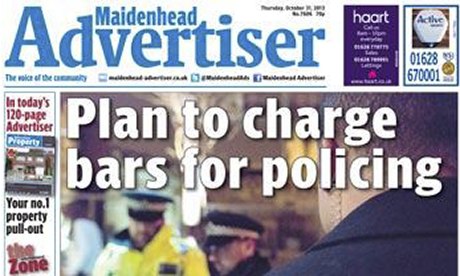
Home secretary Theresa May has warned the BBC that the "might" of its online news operation is undermining local newspapers.
May, the Conservative MP, speaking at the Society of Editors conference in London on Monday, said the BBC claimed it was opening up markets with its activities, such as online, when in fact it was dominating them.
"There is a real need for the BBC to think about its own position and what it is doing and the impact it has," she said.
"If the BBC can provide all the locally-significant news, what reason is left for local people to buy a newspaper? That's as dangerous for local politics as it is for local journalism.
"The BBC has to think carefully about its presence locally and the impact that has on local democracy."
May said it would be a "sad day" if the BBC helped bring about the demise of local newspapers such as her own, the Maidenhead Advertiser.
"As the local MP I value my ability to raise issues in my local newspaper ... It is fiercely independent and influential, people read it because it tells them what is happening and it would be a sad day if the might of the BBC affected its availability," she said.
May's comments come at a sensitive time for the BBC as it gears up for the renewal of its royal charter in 2017.
Conservative party chairman Grant Shapps said last month that the BBC could face a cut in the licence fee or have to share it with other broadcasters unless it rebuilt public trust and became more transparent.
Last week former senior BBC executive Roger Mosey, who oversaw the corporation's London 2012 Olympics coverage, suggested more of the licence fee could go to its commercial rivals and that BBC3 and BBC4 could be axed to prevent programming spend being spread too thinly.
"I had a conversation with a very senior individual [at the BBC] a few years ago who said all they did was open up markets for others to come in," said May.
"I pointed out, as we have seen with BBC Online, it did not open up the market but dominate it in a way that prevents others from being able to come in and have that sort of access."
May said local newspapers were having a "particularly hard time. That's party been a result of the BBC's dominant position on the internet and its ability to subsidise the provision of internet news using the licence fee.
"This makes it enormously difficult for local newspapers to compete … It is destroying local newspapers and could eventually happen to national newspapers as well."
May said she wanted the BBC to change of its own accord, rather than facing a "ban" on certain activities or the prospect of legislation.
"One of the challenges is delivering changes in behaviour without doing precisely what you wouldn't want us to do, banning particular forms of media outlets operating in particular markets.
"We had a flurry a few years back about how local the BBC was going in terms of their provision at the time and they slightly backed off. If you were expecting me to say the government is about to legislate, we're not."
• To contact the MediaGuardian news desk email media@theguardian.com or phone 020 3353 3857. For all other inquiries please call the main Guardian switchboard on 020 3353 2000. If you are writing a comment for publication, please mark clearly "for publication".
• To get the latest media news to your desktop or mobile, follow MediaGuardian on Twitter and Facebook.

